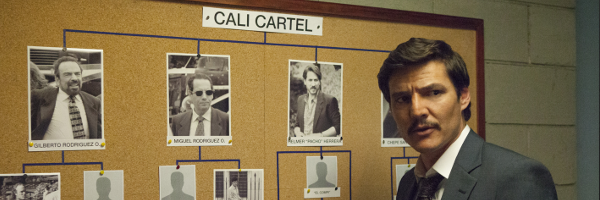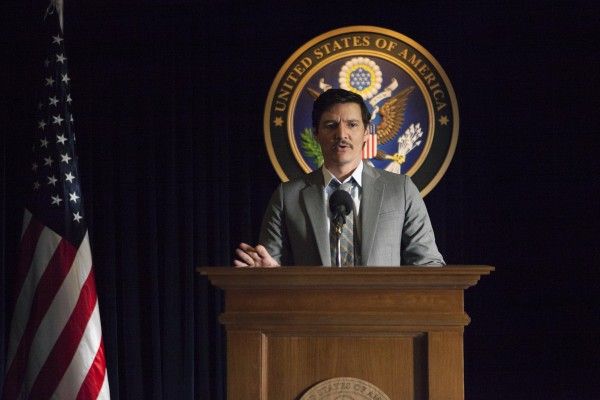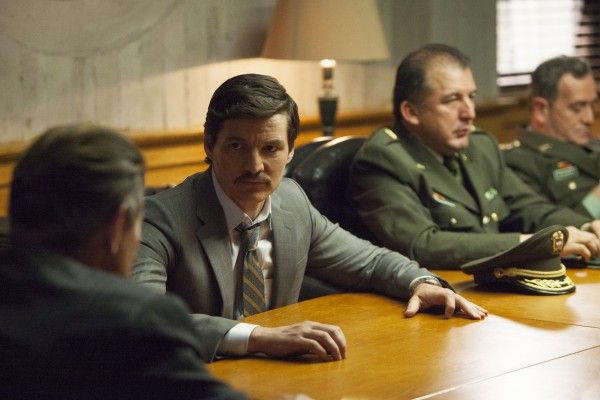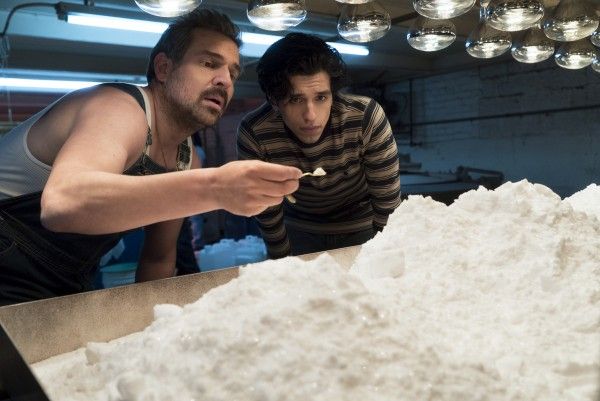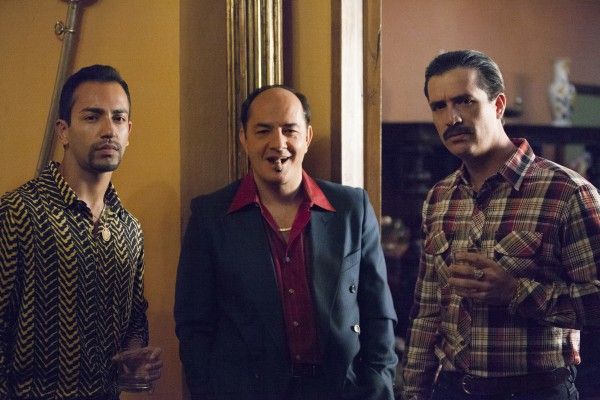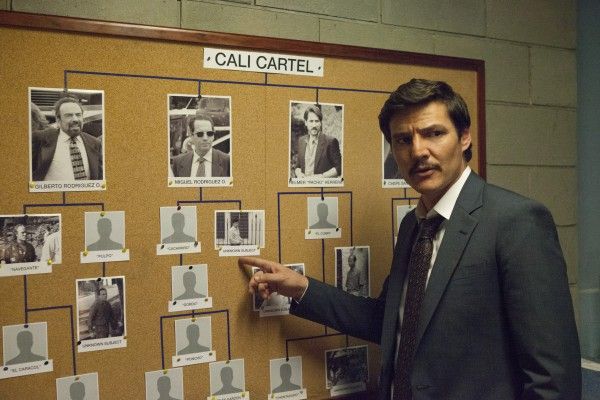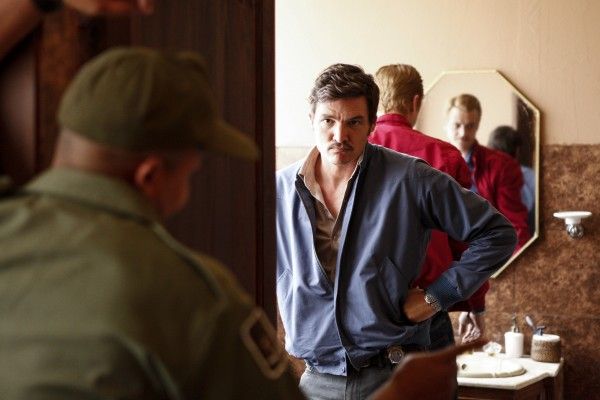With Narcos Season 3 about to start streaming on Netflix, I recently landed an exclusive interview with Pedro Pascal. If you’re not familiar with the show, the excellent crime drama chronicled the hunt for Pablo Escobar in its first two seasons and now that they reached the end of the infamous kingpin’s story, they’re taking on the next chapter in the rise of the Colombian drug trade — the rise of the Cali Cartel. Led by four powerful godfathers, the Cali Cartel succeeded Escobar, growing the cocaine trade into a global enterprise and forging one of the most powerful crime syndicates in the world. But unlike Escobar, who loved to dominate headlines around the world with his brutal killing of anyone that stood in his way, the Cali cartel is the polar opposite, preferring to keep its violent actions out of the headlines.
During the interview Pedro Pascal talked about why he thinks people love watching shows about criminals, the way his character Javier Peña has changed as a character between the end of Season 2 and the beginning of Season 3, how much he knows about the arc of the season before filming begins, the popularity of the show around the world, the way the show gets made, how Narcos creates characters that aren't just black and white, and a lot more. In addition, he talks about how he got involved in Matthew Vaughn Kingsman: The Golden Circle and if he still watched Game of Thrones. Check out what he had to say below.
COLLIDER: First of all I love Narcos. I've seen the first five episode of Season 3, it's great.
PASCAL: Awesome. Thank you.
But ... to start with a fun question, do you still watch Game of Thrones? And what are your thoughts on last night?
PASCAL: I didn't see last night so just stop right there. I was on a plane. I'm up to Episode 6 so I have yet to see last nights episode and I'm hiding from the world until I do.
So you're as spoiler phobic as all of us.
PASCAL: Yes, I am very, very spoiler phobic. I have returned to my role as audience member after season four and am completely up to date and I can't wait to be completely caught up.
Yeah, I'm gonna tell you a secret: it's good. That's all I'll say.
PASCAL: Yeah that's what I've heard. My sister was like, "Oh my God!" I was like, "Shut up!"
I'm glad you get into it as much as all of us.
PASCAL: Oh yeah. Definitely.
Back to Narcos: People love to watch shows about criminals. Why do you think that is?
PASCAL: I think that like the show Game of Thrones, our fascination with power struggles is pretty unanimous. And that's what Narcos is. We're dealing with an industry of drugs and all of the forces fighting against it and positioning themselves in power against it or with it. And so they're talking about billions of dollars, a multi billion-dollar industry, which invites all of the chaos and violence and obviously extravagant life styles that is so otherworldly to us average audience members. I think that there is just a general fascination with the story of power struggles that is obviously so dominant in this world, in this storytelling.
How would you describe the way Peña's changed as a character between the end of Season 2 and the beginning of Season 3?
PASCAL: Well Peña finds himself in a really interesting, precarious position in season three where, established in seasons one and two, is a man who is very comfortable working in the shadows and on his own terms and suddenly he's much more exposed and there are a lot more responsibilities that he has to be committed to, as far as this strange promotion he's been given. He's definitely not following anybodies rules. And so going up against the beast that is the Cali cartel in the position that he's in and to discover day after day how to fight this animal that is so different in the Escobar empire is a very unpredictable experience. It was unpredictable for me to act it because I didn't know what was going to be happening from one episode to the next. I had to find out ... I had to wait until a script was handed to me to know.
It's interesting you say that, because I was going to ask you how much you try and learn about the arc of the season prior to filming, and how many scripts are you normally given?
PASCAL: Well it was easier to have an understanding of what the arc would be in seasons one and two because I knew that the Escobar storyline would be taken care of in two seasons and knowing that the character that I play was a real agent that was a part of that history. It was different to begin, I knew less about the Cali cartel, so I found it more fascinating, the new information that I was discovering and the research that I was doing for season three and it was a far more insidious operation where the society that they are controlling, they are much more implemented into. It makes it a lot harder to take down. And as far as season three was concerned, and in contrast to season one and two, I was really, really finding out what I was going to be doing from episode to episode.
Because sometimes, for example, with Game of Thrones they usually finish all 10 scripts before filming begins.
PASCAL: Yeah – No, we were writing as we were going.
That must be interesting.
PASCAL: Yeah, it was very interesting. It kept me on my toes that's for sure.
When you went in and met with Narcos and with Netflix and they were pitching you on the show, did they pitch you on "we have an idea for a show that could run 5 seasons?" Or they just pitched you on a two-year arc for the Escobar, and then "let's see what happens."
PASCAL: They clued me into a two-year arc. They weren't specific and they didn't limit it strictly to that, but I was definitely under the impression that I had a job for at least two seasons. And that's it.
Netflix seems to be ... they don't really tell creators or anybody their numbers or the viewers. Are you as in the dark as the rest of the world?
PASCAL: Oh yeah. Even more so I would say. It seems like information from the outside closes me in as much as being on the inside. I've no idea what the numbers are, or the algorithms, I do know that the more and more I travel into the world people are recognizing me more and more for Narcos and that's all over the world and that gives me somewhat of an impression that people are watching I guess.
Well the thing I think a lot of people forget is that Netflix owns worldwide rights. So they're not just aiming at the American audience, I'm sure that Narcos is incredibly popular in Mexico, South America, in Asia; it's everywhere.
PASCAL: Yeah, it's true. In Europe very, very, very popular in Europe. They seem to really love it in Spain and in the UK.
So what's a typical shooting schedule for you, do you usually start at a certain time of year? Is the shoot normally six months?
PASCAL: It's about six to seven months shooting down in Columbia. We've shot all of the first three seasons on location in Colombia and we did kind of adhere, luckily, to a kind of fall into spring schedule and one director will direct two episodes at a time, almost like it's an independent feature, so we've got about five weeks to do two episode blocks that are under the helm of the same director. All of our directors are more film based directors, feature film directors, so it was really, really like, because we had 10 episode seasons, like doing five hardcore Indie dramas in a row.
That's crazy and cool.
PASCAL: Yeah, it was definitely both.
I have not finished Season 3 yet, and I hate spoilers, but does Season 3 end in a way where you are excited for a fourth season or is there still more story to tell?
PASCAL: I think that the irony that as many goals that are accomplished by the characters per season, how many battles are "lost and won". You definitely get a sense of a full chapter in season three that has a beginning a middle and an end and also this kind of open quality because the reality is that the industry has many facets and territories of power that it's expansion, while being fought, is definitely evident and there doesn't seem to be any limit to what they can do and where they can go.
One of the things that I love about the show is that it doesn't show characters that are just black and white. Everyone is in a gray area, and almost everyone is being asked to question how far they are willing to go. Can you sort of talk about that aspect of the show and just the quality of the writing?
PASCAL: Yeah that's something that I've always loved. The opportunity to create an ambiguous sort of tone to this disintegrating character of Javier Peña because that's what seems to make most sense to me, in terms of the logic of what his reality was and what is artistically more interesting and truthful to me. Where this story of good guys, bad guys, it doesn't ring completely true to me. Those lines get more and more blurry the deeper you go and the deeper you get into it and I think that that's something that the show does well and I'm really thankful for the creators to give me license to explore that.
It seems like you've been paying your dues a long time trying to make it to get the juicy parts. It does seem like recently you've been landing some much bigger roles. So do you sort of feel like you've made it now as an actor more than you have maybe in the past?
PASCAL: My life definitely changed after Game of Thrones and then Narcos comes along, it's really just fortunate and I love the risks that can be told in story telling and to be a part of what feels like a golden era of television is definitely the thing that changed my life, career wise. Making it, I think that we all have a hard time understanding what that's supposed to feel like, but I'm definitely busy and incredibly grateful.
I'm curious, with Triple Frontier, is that getting ready to go? Are you doing that?
PASCAL: Triple Frontier is hopefully happening, yeah. There isn't much more I can say about that.
Okay, in other words the contract is not signed yet?
PASCAL: In other words, I think that they're putting a lot of pieces together to make it happen and my fingers are crossed that it does.
I'll switch to something that you can talk about: I loved the first Kingsman and I've seen about 30 minutes of the sequel.
PASCAL: Oh wow! Yeah man, the movie's awesome.
What was it like working on the sequel and collaborating with Matthew Vaughn because he's such a cool director?
PASCAL: Yeah, he's such a cool director. He's a director that saw me in Narcos season 1. My opinion that I'm in a very, very supporting role in season one and yet it was enough for him to see something that inspired him to create this bad ass Agent Whiskey character with me in mind. And he's very much like that, he's very specific, he knows exactly what he wants, but he's also extremely collaborative and we definitely were on the same page in creating this kind of Burt Reynolds throwback of cool. And if it works I credit it all to him.
When I spoke to him, he told me that in the first movie there's that church sequence, which brings down the house, and he says the sequel has four or five sequences like that. Did you get to be a part of any of the epic and big action set pieces?
PASCAL: I think so. I hope so. I would consider a couple of my scenes to be among the best in the movie (laughing).
Narcos season 3 starts streaming on Netflix September 1st.

